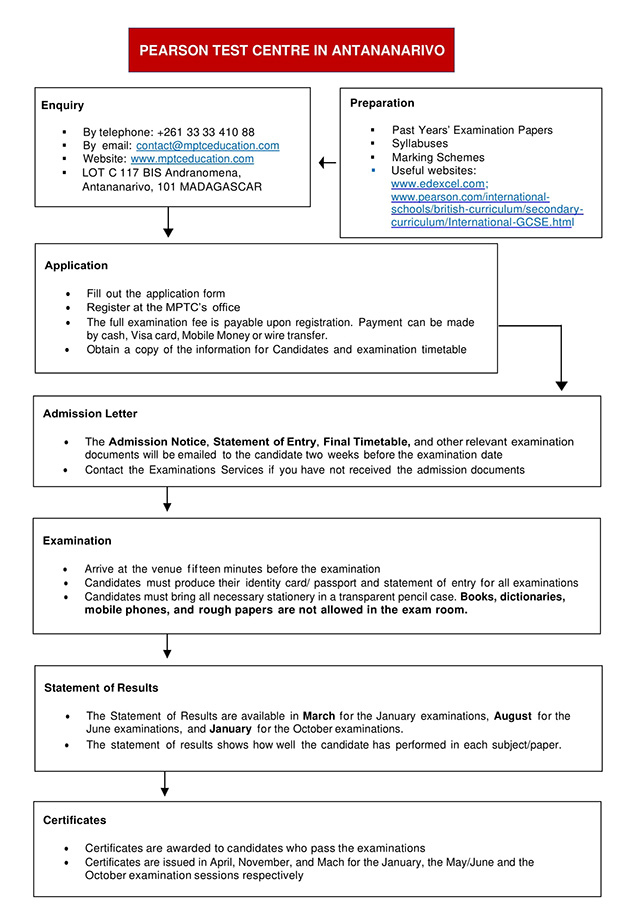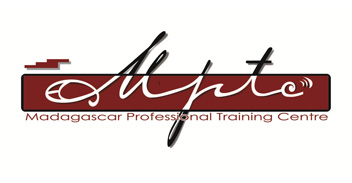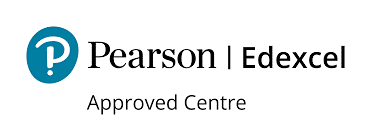Information for Candidates International GCSE and International Advanced Level
Edexcel, a Pearson company, is the UK’s largest awarding body offering academic and vocational qualifications and testing to schools, colleges, employers and other places of learning in the UK and internationally. Pearson Edexcel has set the standard for worldwide recognised qualifications, built on the UK educational system and accepted by universities worldwide, for more than 150 years.
At Madagascar Professional Training Centre (MPTC); you may register for the International GCSE and International Advanced Level examinations. Candidates have a wide variety of subjects to choose from in each qualification. Once you have studied for the examination, you may contact Madagascar Professional Training Centre (MPTC) and register for the examinations as a private candidate.
The International GCSE (IGCSEs) and International Advanced Level (IALs) examinations:
International GCSEs and International Advanced Levels are part of iProgress, the complete series of Pearson Edexcel academic qualifications for 5 – to 19-year-olds, for international schools. The iProgress family includes: iPrimary, iLowerSecondary, International GCSE (IG), GCSE, International Advanced level (IAL), GCE A level. Pearson Edexcel IGCSEs and IALs qualifications are available to students attending International Schools (outside the UK) and any students attending Online Schools.
Pearson Edexcel International General Certificate of Secondary Education (IGCSE) is an international qualification aimed at learners aged 14 to 16. They are a variant on the UK General Certificate of Secondary Education (GCSE). International GCSEs provide the skills and knowledge needed to progress to A Levels, International A Levels, onto university and into employment.
Pearson Edexcel International GCSEs use the 9–1 grading scale which is also used for the Ofqual regulated GCSEs. The new scale was introduced by the UK government to raise standards and recognise outstanding performance.
Pearson Edexcel International AS/A levels, also known as Advanced Subsidiary Levels / Advanced Levels (IALs) are commonly chosen by students aged 16 to 19. International AS/A Levels are at a higher academic level than International GCSE; they are globally recognised qualifications which open doors to top universities worldwide.
What qualifications do I need to enter for examination?
There is no basic qualification or age restriction to register for the examination.
What are the subjects offered?
Pearson Edexcel covers a wide range of subjects for International GCSE and International Advanced Level.
International IGCSEs are available in 37 subjects, they are equivalent, grade for grade, to UK GCSEs and accepted by universities globally. To see what International GCSE subjects we offer, visit the homepage for International GCSEs at https://qualif ications.pearson.com/en/qualifications/edexcel-international-gcses.html
International AS/A levels are available for 21 subjects, they have a modular structure, yet remain comparable to GCE AS/A levels. The list of subjects offered can be found at: https://qualif ications.pearson.com/en/qualifications/edexcel-international-advanced-levels.html
The most popular subjects are Biology, Chemistry, Physics, Economics, Accounting and Mathematics. The exam board may offer session specific subjects like Law which is only available in June.
There is no limit to the number of subjects a candidate can register for.
When are the Edexcel examinations held?
| Qualification | Examinations | Standard Registration Closing Date |
| International GCSE | June | March 10 |
| International AS/A Level | June | March 10 |
International GCSE and GCSE comparability
Pearson Edexcel is the f irst awarding body to introduce 9-1 grading for International GCSEs to ensure comparability with GCSEs. Pearson is using a consistent approach to designing, developing and awarding GCSEs and International GCSEs – so that standards are comparable. Similarities are clearly observed between the GCSE and International GCSE in relation to qualification size and duration, content, learning outcomes and assessment across all subjects. Also, marking processes are in place to ensure consistency and fairness in the allocation of grades across the subjects.
International A Levels and A levels comparability
A level qualifications were recently updated in 2015 following changes introduced by the UK Government. Pearson Edexcel IALs were launched in 2014 with a modular structure.
| Summary of key IAL and A level features | ||||
| Pearson Edexcel GCE AS level | Pearson Edexcel International AS level (IAS) | Pearson Edexcel GCE A level | Pearson Edexcel International A level (IAL) | |
Structure | Linear (all exams taken at the end of a one-year programme)
Standalone qualification and no longer contributes to GCE A level grades. | Modular and flexible structure with all units examined International
AS contributes 50% to the IAL grade or can be a standalone qualification | Linear (all exams taken at the end of a two-year programme) | Modular and flexible structure with units examined
Typically studied over a two-year period |
Assessment | Mainly examination based
May/June examinations only. | 100% examination based
Examinations in January, May/June and October | Mainly examination based
May/June examinations only. | 100% examination based
Examinations in January, May/June and October |
| Grading | A – E | A* – E | ||
Regulator | Regulated by Ofqual | Regulated by Pearson and confirmed by UK NARIC to be comparable to UK AS standard | Regulated by Ofqual | Regulated by Pearson and confirmed by UK NARIC to be comparable to UK A level standard |
International Advanced Level (A-level) examinations typically have two stages:
- International AS Level: This is considered to be half of an A level, as it covers only half of the content and assessment of an A level in the same It’s usually studied in the f irst year of the two -year A level course and is assessed by a combination of coursework and exams.
- International A Level: This is the full qualification and is usually studied over a two -year It is assessed entirely by exams, with no coursework component. A level qualifications are considered to be more rigorous and in-depth, and are typically required for entry into higher education institutions.
The required number of IAL and IAS units can vary by subject:
| Summary of IAS and IAL contributing units | |||
| Subject | Total number of units | Number of required units for IAS | Number of required units for IAL |
| Biology, Chemistry, Physics | 6 (Units 1-6) | 3 (Units 1-3) | 6 (Units 1-6) |
| French, German, Spanish | 4 (Units 1-4) | 2 (Units 1-2) | 4 (Units 1-4) |
Business, Economics, English Literature, English Language, Geography, History, Psychology, IT |
4 (Units 1-4) |
2 (Units 1-2) |
4 (Units 1-4) |
| Mathematics, Further Mathematics, Pure Mathematics |
14 (across the 3 specialisms) | Students take the 2 compulsory units for their specialism from the 6 IAS options | Students take the 4 compulsory units for their specialism from the 8 IAL options |
| Accounting, Arabic, Greek | 2 (Units 1-2) | 1 (Unit 1) | 2 (Units 1-2) |
| Law | This has a 2-year linear structure (no units) | ||
Will the Edexcel International Advanced Level (IAL) Qualification Be Recognised by universities?
Edexcel International Advanced Level qualifications are already recognised by many leading universities in the UK and internationally.
The link below provides an up-to-date list of universities who recognise Edexcel’s International Advanced Level (IAL) qualifications: https://qualifications.pearson.com/content/dam/pdf/Support/services/progress -to- university/IAL_recognition.pdf
How can I register for the Edexcel exam?
In order to sit for the examination, candidates must register with Madagascar Professional Training Centre (MPTC) by submitting the application form before the registration closing dates. Applications forms are availab le at our Office.
You may submit your application form in person or by post. The full examination fee must be settled upon registration. You can pay by cash, Visa card, Mobile Money or wire transfer.
Operating hours at Madagascar Professional Training Centre (MPTC) are as follows:
- Mondays to Friday f rom 00 am to 5.00 pm
- Saturdays f rom 00 am to 4.00 pm
- Closed on Sundays and Public Holidays
Does Madagascar Professional Training Centre (MPTC) have preparation courses?
No. Madagascar Professional Training Centre (MPTC) is a private examination centre, and we do not conduct any preparation course leading to International GCSE, International Advanced Level examinations.
What kind of help and support is available to prepare for the examination?
Past years’ papers are available for download f rom the Edexcel website:
http://qualifications.pearson.com/en/support/support-topics/exams/past-papers.html/student
Alternatively, candidates may purchase copies of the current syllabuses, past year papers f rom Edexcel Publications f rom the following address: http://qualifications.pearson.com/en/support/published -resources.html
Withdrawal from examinations
No transfer or postponement of examinations f rom one session to another (eg. January to June).
No refund will be given for any reason including clashes of dates with local examinations, personal and holiday arrangements.
Madagascar Professional Training Centre (MPTC) reserves the right to cancel any examination or to refuse applications. If Madagascar Professional Training Centre (MPTC) cancels an examination, a full refund of the registration fee will be made to candidates.
Taking Examinations with Madagascar Professional Training Centre (MPTC)
Madagascar Professional Training Centre (MPTC) will notify candidates via email of the details of the examinations: date, time and venue two weeks before the examination starts. Candidates are to follow the schedule of the examinations issued by Madagascar Professional Training Centre (MPTC).
Results and Certificates
Madagascar Professional Training Centre (MPTC) will issue the statement of results to candidates on the announced publication dates.
- Examination in January session: Statement of Results will be issued in mid-March.
- Examination in May/June session: Statement of Results will be issued in mid-August.
- Examination in October session: Statement of Results will be issued in mid-January.
The statement of results is not a certificate.
The Certificates will be issued to the candidates two months after the Statement of Results are released. A certificate is awarded to candidates who achieve Grade E and above.
Candidates should note that they will receive certificates only if they cash-in their results. Candidates who decline their results will not get certificates.
Disclaimer
Madagascar Professional Training Centre (MPTC) and the Examining Boards take all reasonable steps to provide continuity of service. We feel sure you will understand, however, that we cannot be held responsible for any interruptions caused by circumstances beyond our control. If examinations or their results are disrupted, cancelled or delayed, every effort will be made to resume normal service as soon as possible. MPTC ‘s liability will be limited to the refund of the registration fee or re-testing at a later date.




